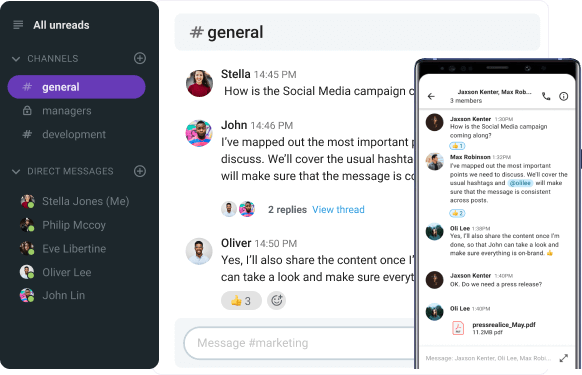Have you ever opened your inbox, waiting to see a job offer, only to find a job rejection email staring back at you?
It’s a tough pill to swallow.
But, you must resist the negative impulse to delete the email and forget the whole unpleasant experience. You can still use this hitch to further your professional career.
For most job seekers, responding to a job rejection email feels counterintuitive. Yet, it’s one of the best actions they can take in such a less-than-ideal situation.
In this blog post, we’ll go over why typing a job rejection email response is a good idea and the difference a few lines of text can make.
Without further ado, let’s jump right in.

- When responding to a job rejection email, you should:
- Express gratitude,
- Highlight that you welcome new opportunities, and
- Stay in touch.
- You should respond to a job rejection because it leaves a good impression and enables you to grow your professional network.
- In your reply, you should always ask for helpful feedback as to how you can be a better candidate.
How to respond to a job rejection email?
So, sending a reply could help you advance your career, but how do you craft the perfect response to a job rejection email?
Aside from figuring out the best way to start and end your email, you also need to:
- Decide on a subject line,
- Express gratitude,
- Highlight that you welcome new opportunities,
- Reiterate the value you could bring to the team,
- Ask for constructive criticism, and
- Stay in touch.
Let’s go over each one of them.
Tip #1: Decide on a subject line
Recruiters sometimes receive upwards of thousands of emails a day and are unlikely to read each message.
As a result, the first thing you should try to do is to capture their attention. Before your fingers even touch the keyboard, remember never to:
- Send an email without a subject line or
- Only state the name of the position.
If the recruiter has interviewed candidates for several positions in the last few months, an email with no subject line will get lost in their inbox. Similarly, typing solely “iOS Developer” provides insufficient information to refresh the recruiter’s memory.
The trick is to keep the subject line short and specific.
For example, instead of titling your reply as “Job Application,” add your name and the position you applied for. This subject line stands out in a sea of generic emails and practically guarantees a second look.
Tip #2: Express gratitude
As Eva Chan, one of Resume Genius’ senior members on the Digital PR and Research team, points out, expressing gratitude is an excellent move:

“Replying to a rejection email is a polite gesture that acknowledges the time and effort the hiring manager put into the review and interview process.”
Your disappointment shouldn’t taint the entire selection process. Reading the rejection email stung, but what about the previous interactions?
Did the recruiter try to ease your nerves during the interview? Were they always prompt and professional in their written communication? If so, consider saying “thank you” with a few brief lines.
Express your gratitude nice & easy using Pumble
Tip #3: Highlight that you welcome new opportunities
You could have been the perfect fit if you had only had a bit more experience. Or, the recruiter may have been impressed by your qualifications but wanted someone slightly more assertive for the position.
Either way, the door for working at the company hasn’t closed yet.
If you’re still interested in contributing to the business, mention it in your reply. Nothing too lengthy, of course. Stick to 1 to 2 sentences explaining that you look forward to future employment opportunities.
For example, you can state:
“I’m open to joining the team in the future.”
or
“I hope we’ll get the chance to collaborate at a later date.”
Tip #4: Reiterate the value you could bring to the team
Despite being rejected, take pride in your qualifications.
Use your reply to politely remind the hiring staff how you could benefit the company in the future.
However, Dr. Kyle Elliott, the Job Search and Career Expert behind CaffeinatedKyle, warns:

“You want to avoid using your response to the rejection email as an opportunity to try and ‘convince’ the hiring manager to hire you, as their mind has already been made up by the point they’re emailing you.”
So, make sure you don’t overdo it. Your response should show you are ready to move on with dignity, so never oversell yourself when replying to a rejection email.
Tip #5: Ask for constructive criticism
If the rejection email offers no feedback, don’t hesitate to ask for constructive criticism in your reply.
Managing Director of the IT recruitment agency VIQU Ltd., Matt Collingwood, echoes this sentiment:

“Self-analysis won’t give you the full answer of why you got rejected, so ask for the answer. Whether it’s directly or through a recruiter, you should immediately respond by thanking them for their time and asking them for feedback.
Always take the feedback as constructive criticism, and use it to turn your weaknesses into your strengths. And if the feedback feels a bit too basic or generic, don’t be afraid to probe a little deeper.”
The CEO of The Annuity Expert, Shawn Plummer, also encourages job seekers to ask for feedback and shares a success story:

“Recently, we offered a role to a candidate we initially rejected last year. The candidate took our feedback on board and obtained the qualifications we told them they were missing, so when they reapplied this year, we gave them the job.”
After implementing feedback from interviewers, you could quickly become a contender for a similar role in mere months. So, welcome any advice that could benefit your career path.
Tip #6: Stay in touch
Rejected applicants may feel like never looking up the company that rejected them again.
However, Chan has had positive experiences with job seekers who went the extra mile to stay in touch. She highlights a specific instance:

“As one of the hiring staff, I’ve had many positive experiences with rejected applicants who responded with kindness and appreciation for our feedback.
One that stands out is an applicant who took the time to send a thank-you note after receiving their rejection email. They were gracious and professional and asked if they could add me on LinkedIn and keep in touch if there are future opportunities with the company, which I thought was a nice move!
It’s always refreshing to see candidates respond positively, even when they don’t get the position they were hoping for.”
Similarly, Anjela Mangrum, a Certified Personnel Consultant and President of Mangrum Career Solutions, underscores the value of professional connections. She shares how keeping in touch can affect a candidate’s job search:

“As a recruiter, I always try to match previously rejected but qualified applicants with new vacancies. I’ve reached out to multiple applicants in the past who I’ve rejected previously just because they kept in touch with me and were, therefore, easy to remember when opportunities came by.”
Although you didn’t get the job, an update email or LinkedIn invite could help remind recruiters you’re open to new opportunities.
Why you should respond to a job rejection email
Properly responding to a job rejection email can help you:
- Maintain a good relationship with the company you applied at,
- Be easily remembered for future opportunities, and
- Leave a positive impression.
Additionally, acknowledging the decision with respect and expressing your continued interest demonstrates professionalism.
You’ve been passed over for a different candidate, but that doesn’t necessarily mean you’ve reached the end of this career road.
There’s no way of knowing how the situation will unfold in the following period since the final candidate could:
- Decline the offer for a position with another company or
- Perform below the required standard in their first few weeks.
Whatever the cause is, in such circumstances, your response to the rejection email sets the stage for future opportunities.
Now, let’s take a closer look at all the reasons we’ve mentioned so far.
Reason #1: It leaves a good impression
Sending off an angry message may provide temporary relief, but doing so is ill-advised.
You display maturity and emotional intelligence when you respond with grace and respect. Hiring managers and recruiters appreciate candidates with these qualities.
Reason #2: It restates your interest
Rejected job seekers often say to themselves that “There’s no need to send a follow-up email! I applied for the job — this proves I’m interested in working for the organization!”
But, how are recruiters to know this? If you’ve made it to the final interview rounds, they know your qualities and may think you’ve already lined up a few more job offers.
You can restate your interest in working for the company with a short and polite email. Then, when a new opening appears, your message could ensure you receive an invitation to an interview.
Reason #3: It lets you take a step back and self-reflect
No one enjoys self-analyzing their application and interview performance after a job rejection. However, this is a chance to see where you could improve.
After receiving your message, the recruiter could disclose what impressed them and where you fell short. With this insight, you’ll know whether you should work on your assertiveness or communication skills, for instance.
As Matt Collingwood states, self-reflection has plenty of benefits:

“If you went through multiple stages of the interview process, I would recommend going back over them. Score yourself for each stage. Think about what went well, what didn’t, and where you received positive feedback.
And, don’t forget to be critical. Could you have put more time into your presentation? Should you have done more research into the company? Did you perform at your best during the technical assessment?”
Even though this process may be uncomfortable, it will help you improve yourself and be an even better candidate.
💡 PUMBLE PRO TIP
Do you suspect you need help upping your interview game? If so, check out this blog post:
Organize & host productive virtual interviews
Reason #4: It enables you to grow your professional network
You haven’t been selected for the job, but that doesn’t mean these new connections won’t help you down the line.
Should the recruiter move on to a different company, who’s to say they won’t remember you for a new position? Or, they might be so impressed by your professional qualities and response email that they forward your contact details to their colleagues.
Of course, this is impossible unless you hit “Send” on a follow-up message.
Moreover, if a specific person interviewed you for several rounds, connecting with them on LinkedIn might be a good idea. This way, you can keep a closer eye on potential job opportunities.
Examples of how to respond to a job rejection email
Now that we know how and why you should respond to a job rejection email, it’s time to see how our tips look in practice.
You can use our examples as the backbone for your reply, customizing them with information that applies to your situation.
Sample “Thank You” letter after a job rejection #1
Subject: Digital Marketing Specialist role decision, Katie Smith
“Dear [Recruiter’s name],
Thank you for considering me for the position of Digital Marketing Specialist at XYZ Corporation.
I’m grateful for the information you and the team shared during our meetings, and I appreciate the time you invested in the interview process. What impressed me the most was how all teams worked closely together to develop the most effective marketing strategy.
Although I’m saddened to hear I haven’t been selected for this position, I still look forward to working for the company in the future. I’ll recheck the website’s careers page and hopefully find an opening that suits my qualifications.
Again, thank you for your time and consideration. I wish you all the best in future ventures.
Sincerely,
Katie Smith”
Sample “Thank You” letter after a job rejection #2:
Subject: Aidan Jones – Data Analyst position
“Hello, [Recruiter’s name],
I appreciate having been considered for the Data Analyst position at XYZ company. Meeting the team has been a pleasure, and I’m in awe of how closely they collaborate with stakeholders to resolve challenging issues.
In addition, their insights showed me how the company operates, which I appreciate as I remain optimistic about the opportunity for future collaboration. Should any similar roles arise, I hope my experience will be a good match.
Thank you for the effort and care you’ve exhibited during this entire process. I wish you all the best in your future endeavors.
Sincerely,
Aidan Jones”
💡 PUMBLE PRO TIP
For additional help when crafting professional emails, refer to the following blog post:
Tips on dealing with job rejection
Regardless of the outcome of the interviewing process, you should keep your spirits up and maintain a positive mindset.
Of course, that’s easier said than done, and you might catch yourself wallowing in self-pity more often than you’d like. But, as long as you keep in mind the below tips, you’ll quickly learn to deal with job rejection.
Tip #1: Don’t take it personally
As we’ve mentioned, feeling down after getting rejected for what you may have viewed as your dream job is normal.
What matters is that you don’t let this experience shake up your confidence.
Ultimately, the company decided to go with someone else, but that doesn’t mean you’re not capable and intelligent. After all, job hunting is highly competitive, and with hiring decisions, many factors are outside of your control.
Furthermore, even after writing a professional reply to the job rejection email, you may not hear back from your would-be employer. Getting ghosted is tough, but as Elliot said, their actions are a reflection of them, not you:

“Not all companies will respond when you reach out after getting rejected. In this case, remember that it’s not you. It’s them.”
Trust that your resilience will help you get over the disappointment and allow you to redirect your focus.
Tip #2: Keep the negativity at bay
When trying to come up with a response to a job rejection email, you could feel frustrated, disappointed, and even angry.
These reactions are understandable, since being rejected after almost reaching the finish line can be demoralizing.
Collingwood advises against voicing these frustrations in a follow-up email to a job rejection:

“I previously worked with a candidate to whom I provided constructive feedback after my client rejected him. The candidate was heavily invested in the role and did not take the feedback at all well.
He found the email address of the manager who had rejected him and sent a very long ranting email where he said the manager’s interview technique was poor and that he wasn’t a good representative of the business.
This keyboard warrior got an unpleasant surprise 6 months later, when he started a new role and found out his new manager had just started at the company and was the manager he had previously tried to go to war with. It made for a very awkward working relationship.”
For Mangrum, reading a ranting email from a rejected candidate equates to burning bridges:

“From my experience, most professionals ignore rejection emails and are, therefore, easily forgotten. Out of those who respond, some are polite and professional, while others are emotional, having foot-long rants about how they deserved to get hired, forcing me to mentally cross them off for any future opportunities due to their unprofessional outbursts.”
As you work through your emotions, you can fend off negativity by appreciating everything good in your life. For some, that means spending time with friends and family. If you’ve formed close friendships with people you’ve worked with in the past, they can be a great source of support.
💡 PUMBLE PRO TIP
Another way to keep the negativity at bay is to learn how to increase positive and decrease negative business communication, which you can do by reading our blog post on the topic:
Tip #3: Don’t compare yourself to others
Comparing yourself to others is an act of self-sabotage.
Receiving the news you’ve been rejected stings badly enough, so there’s no need to punish yourself further with unfavorable comparisons.
Remember that, although the job market is competitive, the only person you should outperform is yourself.
So, no looking back over your shoulder to see how others are faring.
No matter how many times you reply to a rejection email, remind yourself that you’re inching closer and closer to a position where you’ll excel.
How to ask for feedback after job rejection
As we already mentioned, a great way to deal with job rejection is to turn it into an opportunity by asking for feedback that will help you improve your future endeavors. Receiving feedback will not only help you cope with the rejection, but, most importantly, learn from any mistakes you may have made and better yourself as a candidate.
There are a few key steps you should follow when crafting your feedback request within your job rejection email reply, such as:
- Explain that you are always trying to improve in your job search and your career.
- Ask if there was anything they thought was lacking, such as experience or knowledge.
- Ask for any feedback as to how you can improve as a candidate in future interviews.
- Ask for more information if you receive a vague answer.
- Accept the feedback you receive as constructive and helpful.
- Don’t be discouraged if you don’t receive a proper thought-out response, and move on.
Examples of how to ask for feedback
Some helpful examples of asking for feedback within your job rejection response include:
- Example #1: Inquiring about general feedback
“I constantly seek opportunities to enhance my professional growth. Could you please provide constructive feedback that would be beneficial for my future applications to your company?”
- Example #2: Inquiring about specific feedback
“Being dedicated to ongoing self-improvement, I would appreciate your feedback. I am interested in understanding if there were any specific skills or qualifications I might have lacked for this role. Could you please provide some suggestions on what I can focus on for development moving forward?”
💡PUMBLE PRO TIP
If you would like to learn more about the best ways to ask for feedback, read our blog post:
Pumble makes everything easy — Even responding to a job rejection
All things considered, it’s best to swallow your pride and reply to a rejection email. You have nothing to lose.
That’s especially true if the company you were looking to work for added you to their Pumble workspace via guest access. In that case, responding to the direct message or channel announcement you received is the only way to go — after all, you don’t want to burn any bridges, even when rejected.
Of course, always remember to keep the response:
- Polite,
- Short, and
- Professional.
Don’t underestimate the power of kind words! If you’ve shown yourself in a good light during the interview rounds, new opportunities could come your way sooner than you think.
See how Pumble can transform the way you communicate!







